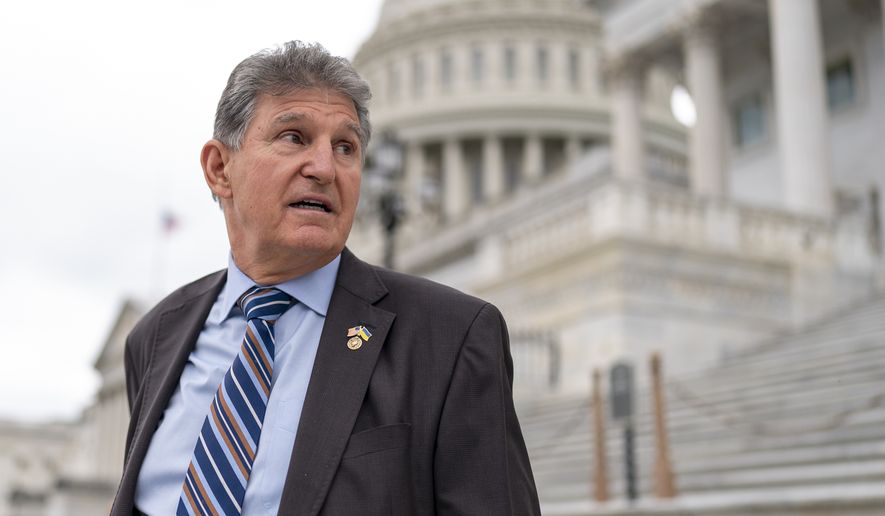Richard Glick isn’t a household name, but he has arguably been one of President Biden’s most accomplished lieutenants in combating climate change in the face of congressional gridlock.
That could come screeching to a halt.
Mr. Glick’s term as chair of the Federal Energy Regulatory Commission (FERC) expires at the end of this month, but it is uncertain if he’ll get reconfirmed in a 50-50 split Senate.
As chairman of the independent agency overseeing power companies and natural gas pipelines, Mr. Glick has infuriated members of the Senate Energy Committee who are tasked with determining whether he should keep his job. That includes the Senate’s most powerful swing vote: Sen. Joe Manchin III.
The West Virginia Democrat, who recently said Mr. Glick should “just do your damn job,” has the power to single-handedly tank the appointee.
Mr. Glick’s support of tougher climate change and equity standards for pipelines put him on the outs with Mr. Manchin and Republicans.
SEE ALSO: Treasury Secretary Janet Yellen admits she was wrong on inflation
He was confirmed to a five-year term at FERC in 2017 under President Trump and elevated to chairman last year by Mr. Biden.
As chairman of the Senate Energy Committee, Mr. Manchin will control the confirmation hearing. He’s held his cards close to his vest and hasn’t signaled whether he’ll support Mr. Glick.
Republicans are expected to reject Mr. Glick this time around, despite originally being nominated to the commission by Mr. Trump and being confirmed by voice vote. Opposition from just one Senate Democrat would sink him.
Forcing out Mr. Glick would deliver yet another blow to Mr. Biden’s clean energy and climate agenda. Democrats blame Mr. Manchin for derailing the president’s $1.75 trillion climate and social spending package.
“I think it would be tough for anybody with a record at an agency going for reconfirmation because energy has become so polarized, and in a 50-50 Senate, everything is challenging,” said Neil Chatterjee, a Republican and former FERC chairman who served with Mr. Glick for several years.
Mr. Chatterjee said that Mr. Glick, a Democrat, could bring much-needed regulatory stability at a crucial time for the energy industry. Under FERC rules, Mr. Glick has until the end of the year to remain in his position, even if he is not reconfirmed.
“It’s really important to maintain durability in regulatory uncertainty. What you’re seeing in other agencies is a total whipsawing of policy from one administration to the next, and when it comes to something like electricity, you don’t want electric policy to fluctuate like that,” he said.
Absent Mr. Glick, FERC would revert to a deadlocked commission with two Democrats and two Republicans, potentially stalling work that could otherwise get done.
Mr. Glick’s most controversial move that has jeopardized his job came a few months ago and remains fresh in the minds of his critics.
After courts repeatedly overturned FERC rulings for not sufficiently considering the environmental impacts of new natural gas pipelines, Mr. Glick acted. FERC voted 3-2 along party lines to more closely assess pipelines’ impact on climate change and disadvantaged communities.
Fierce backlash erupted from politicians and the industry accusing FERC of straying far outside its jurisdiction and jeopardizing the country’s energy reliability and security. Mr. Manchin, who was among the harshest critics of the new policies, unleashed his “just do your damn job” comment and hauled in all five commissioners to testify.
Mr. Glick eventually backtracked, saying FERC would treat the new policies as drafts and hold off on implementing them.
That move may have saved his job, Mr. Chatterjee and another FERC alumni said, emphasizing that Mr. Glick needs to show senators he is willing to consider political and industry concerns.
“There was a lot of concern,” Mr. Chatterjee said. “Since then, to the chairman’s credit, I think he’s listened.”
• Ramsey Touchberry can be reached at rtouchberry@washingtontimes.com.




Please read our comment policy before commenting.